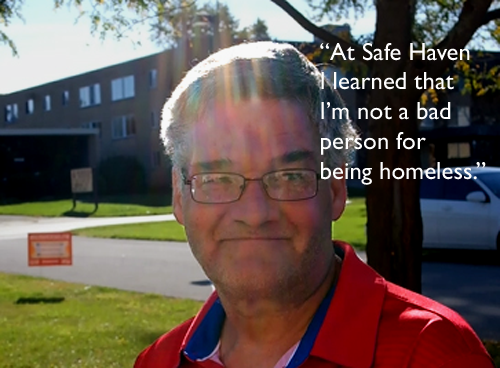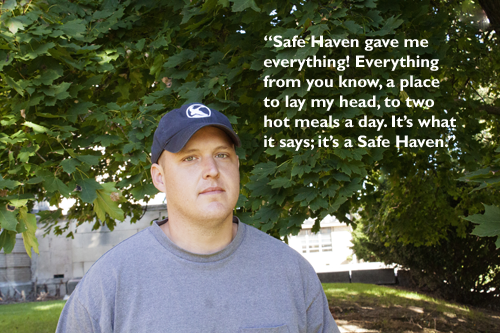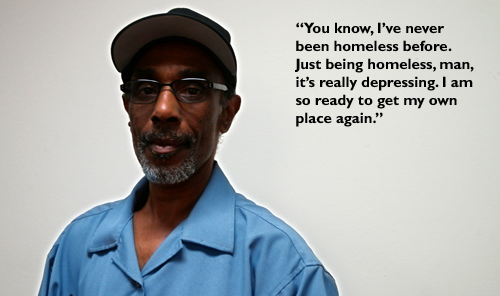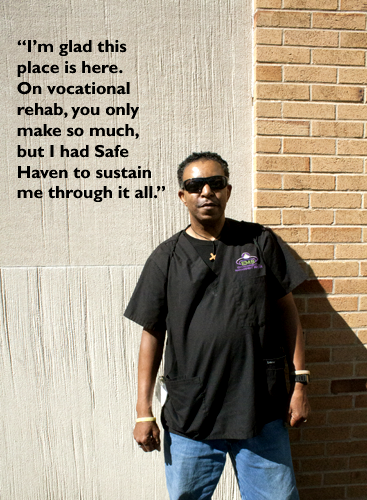Safe Haven: A Housing First Model for Homeless Veterans

Jim, a homeless Navy veteran, found transitional housing for veterans in Fort Wayne, IN but was kicked out because he couldn't abide by their treatment requirements. He was worried that he would ha
ve to out to the streets again, but a place was available for him that would take him with the problems he already had. That place was The Richard Lugar Safe Haven, a housing-first based transitional housing program provided by Volunteers of America of Indiana. With the help of his case manager and other Safe Haven staff Jim is now thriving and has hope for the future. He is participating in job training, and is currently looking for his own apartment with a HUD housing voucher that he obtained with the help of his case manager. The program has also allowed Jim to be more social and Jim loves having friends again.
The VA National Center on Homelessness introduced the new Safe Haven housing-first model in 2010 to help veterans just like Jim, who were unsuccessful in traditional housing programs. This program provides housing stability for those with active addiction so veterans can feel safe and secure enough to make steps towards sobriety and independence. The Safe Haven model doesn't place treatment requirements on residents, instead residents work with case managers on root causes of their homelessness and clients focus on reaching personal goals, which include steps towards sobriety. With the help of supportive services provided by Volunteers of America of Indiana and the Veterans Administration, residents become stable enough over time to gain employment and transition to their own home.
The purpose of this system is to meet people where they're at and make their substance use manageable. As David Wilson, the clinical coordinator at Safe Haven, describes it, “This facility opens us up to whatever problem they've got at that moment. And then work to get that down to where you can live independently, what we call a harm reduction model. And so I would start working with them, and put goals together into a behavioral contract. They literally look at it and sign it, we work together and the notion is to get them down to whatever that level is that they're in full control. After one guy went through that process he told me that for the first time in his life he can walk away from half a glass of beer on the table. I think if you come right down to what makes the most difference for most of these guys, the biggest thing is to get them to realize is that they're worth it."
Joseph, Wayne, and Xavier (names have been changed), all current or past residents of Safe Haven, best illustrate how Safe Haven offers hope, restores dignity and transforms the lives of homeless veterans.
Joseph served in the active army in the mid-2000s and became homeless when he lost support from friends and family. He has steady work from a temp agency, but his finances have not been secure enough for him to maintain personal housing. He has lived in Safe Haven for five months and is working on budgeting skills. With the help of his case manager he is looking for a place of his own. He's grateful for the reassurance he has in knowing that he has somewhere to sleep every night in this rocky point of his life.

Wayne, a Marine veteran on disability works as a cook for various friends. Due to serious personal problems he became homeless and resorted to heavy drug use. His addiction caused him to struggle with properly spending and controlling his money. Wayne has lived at Safe Haven for eight months were staff helped him obtain a trustee for his finances to support responsible spending of his fixed income. Wayne is very excited to receive extra help with finances. He has recently secured an apartment and is excited for the homeless period of his life to be over.

Xavier lived on the streets for a while but decided to swallow his pride and go to the VA for help. He subsequently moved into Safe Haven and went to vocational rehab at the VA hospital where he is now employed full time. After six months Xavier moved out of Safe Haven with a fellow Safe Haven alum and is doing great. He recently visited Safe Haven to share with staff and current residents that he is happy and enjoys his job.

With case management, employment services and partnerships, and attention to behavioral health, Safe Haven has been able to welcome Veterans with a variety of problems with open arms. Consider donating $45, the price of a monthly bus pass, to help these homeless Veterans without transportation have the mobility to look for housing and employment. Or check out more services that Volunteers of America of Indiana offers to Hoosier Veterans.
GIVE TO HOMELESS VETERANS
